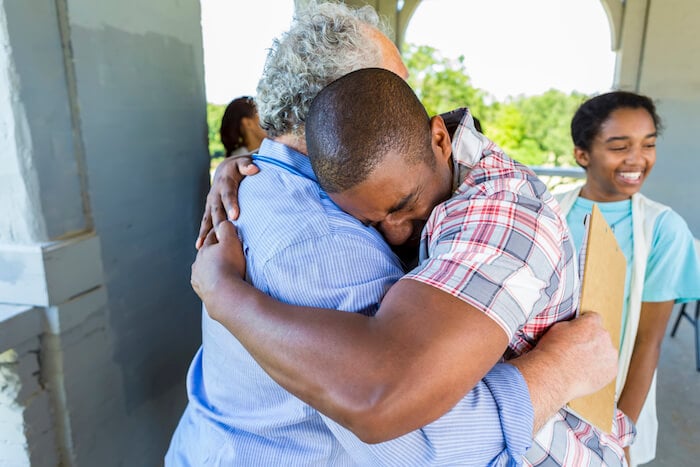If you’re like most people, you’re not always sure how to forgive someone when he or she hurts you. It isn’t easy to forgive when your mind and heart resist letting go of the pain or anger. How can you release and heal the emotions associated with an unloving or thoughtless action? Learning how to forgive someone when you have been hurt is a process and takes time and self-awareness.
Why is forgiving someone so difficult?
It’s hard to let go of a painful experience and forgive the person who may or may not know what he did. You may be convinced that the person who hurt you did it intentionally and is therefore cruel or selfish at heart. If so, you may feel a lot more rage than compassion. It’s natural human behavior to want to retaliate when you are hurt by someone else. However, there are other factors working against your motivation to forgive. You might believe the offending person won’t admit to what he has done, or you think forgiveness is a form of backing down or burying your head in the sand. Another reason that offering forgiveness is difficult is self-protection. You need to keep up your guard in order to prevent getting hurt again. As long as you hold hostility toward the other person, you have an excuse for your wall of defense. However, if you tell yourself that forgiveness means being vulnerable to more pain, you’re embracing a common fallacy that forgiveness condones the actions of the offending person. Forgiving someone isn’t absolution from blame or the consequences of harmful or hurtful behavior. Forgiveness occurs in your heart and requires a conscious and intentional willingness to release the negative thoughts and feelings associated with the person involved. It doesn’t mean that you must accept bad treatment or that you don’t need to employ appropriate consequences. You can clear your heart of anger and also maintain healthy boundaries. You can truly forgive while also communicating in an emotionally mature way about the hurtful impact of the situation. If you have a hard time empathizing with others, you may find it especially tough to forgive anyone who has hurt you. Although you can never fully know why another person acts a certain way, if you practice empathy, you can view the situation rationally and try to see it from his or her point of view. To do this, you need to see the best in other people instead of jumping to conclusions about their character or intentions.
How to Forgive Someone Who Hurt You
Although forgiving and letting go is difficult, it is important in order to find peace of mind and happiness. Let’s review some scenarios in which you may need to forgive someone and explore practical strategies to help you through this process. Consider each of these 3 steps to forgiveness and use them to move on:
1. Change Your Perspective
You have to accept that whatever happened can’t be undone, so it is important to let go of any resentment you are holding towards the other person. This will be the first step toward forgiveness and moving on with your life and continuing your relationship with the other person if you wish to do so. Tell yourself things like, “I am angry because he hurt me, but I accept that this has happened and it can’t be changed.” Recognize that you have no control over the past, but you can control your reaction in the present moment.
2. Practice Self-Awareness
Try to accept his or her wrongdoing by considering how you may have hurt people in the past, and remind yourself that you have flaws as well. Everyone makes mistakes and acknowledging your own mistakes allows you to have empathy for the person who hurt you.
3. Listen to the Other Person
An important part of empathy is listening to the other person as they tell his or her side of the story. There are always two perspectives, and even if you feel your viewpoint is the correct one, you should allow the person to talk without interrupting so you can gain insight into this person’s heart and mind. Try to give appropriate feedback during this conversation by asking clarifying questions to make sure you understand what he or she is saying. This may not be a one-and-done process, but the sooner you can let go of your resentment, the sooner you will be able to move forward.
How to Forgive Someone Who Isn’t Sorry
It feels like a double slap in the face when someone who has hurt you refuses to apologize or take responsibility for his or her actions. When someone hurts you, you want this person to be accountable and to feel remorse. However, your tight grip on resentment won’t change his or her unwillingness to accept responsibility. Your anger will not teach this person a lesson. In fact, your lack of forgiveness will only weigh on you and hold you back. If someone isn’t sorry for what he or she has done, remind yourself that you are not forgiving this person for his benefit, but rather you are doing it for your own sanity. In the end, whether or not the person accepts responsibility, you have done your part once you have offered forgiveness. Learning to forgive allows you to make peace with yourself, and you have made emotional peace with the other person.
How to Get Someone to Forgive You
If you have upset or hurt someone, and you know you’re in the wrong, then hopefully you’re eager to be forgiven. However, receiving this forgiveness is in the other person’s hands. Here are some thoughts on how you might be able to facilitate the forgiveness you need:
1. Be Patient
First, give her some time and space to relax and cool down. This will allow her to process what’s happened and put things into perspective. Waiting for forgiveness can be painful, but you need to allow the person you hurt time to calm down and move past the pain.
2. Forgive Yourself
Guilt is a good reminder that you’ve done something wrong, but once you know this, you don’t need to hang on to guilt. While you are giving the other person space, you need to forgive yourself. Remind yourself that you are only human and you make mistakes. Think about what you can learn from your mistake rather than berating yourself about it. Once you have come to terms with the situation yourself, you can talk to him about it in depth and come to an agreement on what can be done to resolve the situation.
3. Accept Responsibility and Ask for Forgiveness
During this conversation, you will want to admit that you were wrong and actually ask for his forgiveness. People want to receive a genuine and sincere apology, not a simple, “I’m sorry.” If you want him to forgive you, you need to show your sincerity by making eye contact and communicating exactly what you’re sorry for. For example, you might say something like “Jack, I recognize that I made a big mistake that has damaged our relationship. Please forgive me for breaking your trust in me by sharing the information you asked me not to share. I want to make this right for both of us.” Offering a longer apology that reflects your sincerity and your true desire to make things right.
4. Change Your Behavior Going Forward
An apology doesn’t mean much if you don’t change the offending behavior. If there’s some wrong you need to right, take action immediately to restore the other person’s faith in you. Learn from your mistake and do your best not to repeat the offense. It will be much harder for someone to offer forgiveness a second or third time.
How to Forgive Someone Who Keeps Hurting You
Should you be expected to forgive someone who keeps hurting you? Is that even possible? It’s a tough thing to do, especially if he or she never apologizes. However, forgiveness doesn’t have to be dependent on either of these factors. Forgiveness is a personal choice to let go of anger and resentment, realizing that it doesn’t serve you to try to get even with your words or behaviors. Forgiveness does not mean that you won’t get angry if the situation happens yet again. You can set boundaries with a repeat offender, especially one who shows no remorse. You can forgive and even end the relationship to protect yourself from further pain. You will need to check-in with your gut and your psyche to weigh the emotional toll this person is taking on your life. Well-intentioned people sometimes don’t have the emotional maturity or inner strength to honor their values and integrity. You can care about someone while recognizing he or she isn’t good for you.
How to Forgive Someone Who Cheated on You
I wish there was an easy to answer to how to forgive someone who broke your heart. If your partner cheated on you, you’re likely feeling hurt, overwhelmed, and confused about how to proceed. If you want to stay in the relationship, you have to acknowledge your anger and pain before you can move forward. Forgiving someone who has cheated on you is certainly not easy, but there are a few things you can do to help you get through it.
1. Give Yourself Time
Give yourself some time to cool off after you find out about the infidelity before you make any decisions or have any heated conversations with your partner. You may feel so overwhelmed by pain and betrayal that your first instinct is to end the relationship and lash out at your partner. During this time, take stock of your relationship and how your partner makes you feel on a day-to-day basis. Do you generally have a good relationship? Could this be a wake-up call that you both need to work on the relationship? Look for anything you can learn about yourself, your partner, and your relationship from this painful situation. Don’t start blaming yourself for the cheating, but rather take an objective look at other ways he or she may have hurt you in the past, and if it is in your best interest to stay in the relationship.
2. Forgive without Punishing
Once you have decided that you want to forgive your partner and move forward in the relationship, try to forgive completely in spite of your changing emotions. Don’t go back and forth by punishing him one day and then trying to make amends the next. If you want to forgive, you need to work on your own fluctuating emotions so you don’t create further discord in your relationship. That doesn’t mean you can’t talk about your feelings or what you need from your partner in order to rebuild trust. But it does mean you avoid passive-aggressive comments and behaviors or outright shaming of your partner. You may need individual and couple’s counseling to help you navigate the early days of reconciliation and forgiveness.
3. Talk Together with Honesty
If your partner is also committed to making this relationship work, make sure that he validates your feelings and understands the damage he has done to the relationship. If your partner hasn’t apologized thoroughly or isn’t accepting responsibility for his or her actions, be specific about what you need to hear before you can move forward. Talk to him about why he cheated and what the two of you can do to make it work at this point. How can you strengthen your relationship together? Part of this involves improving your daily communication and making it a point to talk to each other as much as possible. You may need some behavior changes from your partner, and he or she may require some from you as well.
4. Be Patient
Healing after infidelity can take time. You will feel the sting of betrayal long after you’ve chosen to forgive, and you may struggle with hurt and mistrust for months or years. The cheating partner may feel that she can never do enough to prove her remorse and may feel guilt and shame for a long time. Recognize that the two of you must forgive each other every single day for as long as it takes to heal. You may discover after a period of time that the relationship has been too damaged to continue on as a couple. If this is the case, you can still offer forgiveness and compassion, even if you have to move on.
How to Forgive Yourself
Forgiving yourself can be more difficult than forgiving others, as we are often harder on ourselves when we fall short of our own expectations. Why do you need to forgive yourself? Because guilt and shame will eat you alive, preventing you from moving forward with happiness and self-confidence. Remember that failure and mistakes don’t make you a bad person, and they often offer you an opportunity to learn. Move forward by adopting a new mindset about what you have learned, and apply this new thinking to everything you do in your life. It is important not to dwell on the mistakes that you have made, but instead, make peace with them, accept them, learn from them, and move on. Focus on the present moment and the things that you can possibly do now to improve yourself. You may need to outline a plan of forgiveness for yourself. Here are some ideas to help you:
Redefine the person you want to be based on your personal values and morals.Identify how you strayed from your values with the behavior you need to forgive yourself for.Consider how you will change your behavior going forward.Clarify any actions you need to take to right any wrongs and seek forgiveness.Remind yourself of your essential goodness and your desire to improve.Acknowledge that you deserve forgiveness because mistakes are part of being human.Practice self-acceptance daily, and try to focus on the good things you have done.Remember that you may need to forgive yourself in the future. Self-improvement is a life-long endeavor.
Did these strategies for forgiveness help you? Spread the love.
It can be very difficult to forgive someone who has hurt you — and even more difficult to forgive yourself. You may discover you’ve finally forgiven someone when he or she crosses your mind, and you don’t feel angry or hurt anymore. You’ve forgiven yourself when you no longer feel the sting of guilt or shame about the person or situation involved. Remember, if you are wondering how to forgive someone, don’t wait for them to apologize or show remorse. Forgiveness isn’t about the other person, it is about you and your feelings. The willingness to forgive, even when forgiveness isn’t sought, can improve your mental health, increase personal happiness, and even mend your relationship. There are so many people struggling with issues around forgiveness, maybe someone who is a friend or in your own family. Spread the love by taking a moment to share this post on your favorite social media platform.



